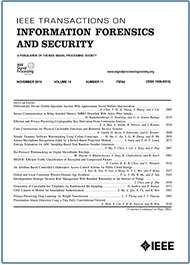- Our Story
- Publications & Resources
- Publications & Resources
- Publications
- IEEE Signal Processing Magazine
- IEEE Journal of Selected Topics in Signal Processing
- IEEE Signal Processing Letters
- IEEE Transactions on Computational Imaging
- IEEE Transactions on Image Processing
- IEEE Transactions on Information Forensics and Security
- IEEE Transactions on Multimedia
- IEEE Transactions on Signal and Information Processing over Networks
- IEEE Transactions on Signal Processing
- IEEE TCI
- IEEE TSIPN
- Data & Challenges
- Submit Manuscript
- Guidelines
- Information for Authors
- Special Issue Deadlines
- Overview Articles
- Top Accessed Articles
- SPS Newsletter
- SigPort
- SPS Resource Center
- Publications FAQ
- Blog
- News
- Dataset Papers
- Conferences & Events
- Community & Involvement
- Professional Development
- For Volunteers
- Information for Authors-OJSP
-
Home
Waveforms for Computing Over the Air: A groundbreaking approach that redefines data aggregation
Ode to Masterfully Written Textbooks: And remembering Simon Haykin [From the Editor]
Conferences Events IEEE Signal Processing Magazine IEEE SPL Article IEEE TIFS Article IEEE TMM Article IEEE TSP Article Jobs in Signal Processing Lectures Machine Learning Seasonal Schools Signal Processing News SPM Article SPS Distinguished Lectures SPS Newsletter Article SPS Webinar SPS Webinars SPS Webinar Series Webinar webinars -
Our Story
What is Signal Processing?

The technology we use, and even rely on, in our everyday lives –computers, radios, video, cell phones – is enabled by signal processing. Learn More » -
Publications & Resources
-
SPS Resources
- Signal Processing Magazine The premier publication of the society.
- SPS Newsletter Monthly updates in Signal Processing
- SPS Resource Center Online library of tutorials, lectures, and presentations.
- SigPort Online repository for reports, papers, and more.
- SPS Feed The latest news, events, and more from the world of Signal Processing.
-
SPS Resources
-
Conferences & Events
-
Community & Involvement
-
Membership
- Join SPS The IEEE Signal Processing Magazine, Conference, Discounts, Awards, Collaborations, and more!
- Chapter Locator Find your local chapter and connect with fellow industry professionals, academics and students
- Women in Signal Processing Networking and engagement opportunities for women across signal processing disciplines
- Students Scholarships, conference discounts, travel grants, SP Cup, VIP Cup, 5-MICC
- Young Professionals Career development opportunities, networking
- Get Involved
-
Technical Committees
- Applied Signal Processing Systems
- Audio and Acoustic Signal Processing
- Bio Imaging and Signal Processing
- Computational Imaging
- Image Video and Multidimensional Signal Processing
- Information Forensics and Security
- Machine Learning for Signal Processing
- Multimedia Signal Processing
- Sensor Array and Multichannel
- Signal Processing for Communication and Networking
- Signal Processing Theory and Methods
- Speech and Language Processing
- Technical Working Groups
- More TC Resources
-
Membership
-
Professional Development
-
Professional Development
- Signal Processing Mentorship Academy (SigMA) Program
- Micro Mentoring Experience Program (MiME)
- Distinguished Lecturer Program
- Distinguished Lecturers
- Distinguished Lecturer Nominations
- Past Lecturers
- Distinguished Industry Speaker Program
- Distinguished Industry Speakers
- Distinguished Industry Speaker Nominations
- Industry Resources
- IEEE Training Materials
- Jobs in Signal Processing: IEEE Job Site
-
Career Resources
- SPS Education Program Educational content in signal processing and related fields.
- Distinguished Lecturer Program Chapters have access to educators and authors in the fields of Signal Processing
- Job Opportunities Signal Processing and Technical Committee specific job opportunities
- Job Submission Form Employers may submit opportunities in the area of Signal Processing.
-
Professional Development
-
For Volunteers
-
For Board & Committee Members
- Board Agenda/Minutes* Agendas, minutes and supporting documentation for Board and Committee Members
- SPS Directory* Directory of volunteers, society and division directory for Board and Committee Members.
- Membership Development Reports* Insight into the Society’s month-over-month and year-over-year growths and declines for Board and Committee Members
-
For Board & Committee Members
Popular Pages
Today's:
- Information for Authors
- IEEE Transactions on Image Processing
- IEEE Transactions on Multimedia
- (ICME 2026) 2026 IEEE International Conference on Multimedia and Expo
- Information for Authors-SPL
- Conference Call for Papers
- Publications & Resources
- IEEE Transactions on Audio, Speech and Language Processing
- Guidelines for Reviewers
- Publications
- (ASRU 2025) 2025 IEEE Automatic Speech Recognition and Understanding Workshop
- Guidelines
- Editorial Board
- Conferences & Events
- Call for Papers for ICASSP 2026 Now Open!
All time:
- Information for Authors
- Submit a Manuscript
- IEEE Transactions on Image Processing
- IEEE Transactions on Information Forensics and Security
- IEEE Transactions on Multimedia
- IEEE Transactions on Audio, Speech and Language Processing
- IEEE Signal Processing Letters
- IEEE Transactions on Signal Processing
- Conferences & Events
- IEEE Journal of Selected Topics in Signal Processing
- Information for Authors-SPL
- Conference Call for Papers
- Signal Processing 101
- IEEE Signal Processing Magazine
- Guidelines
Last viewed:
- SPS TC Job Marketplace
- SPS Travel Grants
- Call for Proposals: 2028 IEEE International Symposium on Biomedical Imaging (ISBI)
- Series to Highlight Young Professionals in Signal Processing: Dr. Angshul Majumdar
- Standing Committees
- (ASRU 2025) 2025 IEEE Automatic Speech Recognition and Understanding Workshop
- SPS Mentors - SigMA Program
- Conference Call for Papers
- (ISBI 2026) 2026 IEEE 23rd International Symposium on Biomedical Imaging
- About IEEE Transactions on Signal Processing
- (MMSP 2026) 2026 IEEE International Workshop on Multimedia Signal Processing
- Award Recipients
- Publications & Resources
- Information for Authors
- SPS Staff
MMAuth: A Continuous Authentication Framework on Smartphones Using Multiple Modalities
You are here
Transactions on Information Forensics and Security
Publications & Resources
For Authors
Top Reasons to Join SPS Today!
1. IEEE Signal Processing Magazine
2. Signal Processing Digital Library*
3. Inside Signal Processing Newsletter
4. SPS Resource Center
5. Career advancement & recognition
6. Discounts on conferences and publications
7. Professional networking
8. Communities for students, young professionals, and women
9. Volunteer opportunities
10. Coming soon! PDH/CEU credits
Click here to learn more.
MMAuth: A Continuous Authentication Framework on Smartphones Using Multiple Modalities
With the wide use of smartphones, more private data are collected and saved in the smartphones. This raises higher requirements for secure and effective user authentication scheme. Continuous authentication leverages behavioral biometrics as identity information and shows promising characteristics for user verification in a continuous and passive means. However, most studies require users to operate the smartphones in a specific mobile application or perform user-defined touch operations. This paper studies the continuous authentication on smartphones in the wild, where it is hard to characterize touching behavior accurately due to the complexity of usage context and cross-use of various types of touch gestures. Towards this end, in this paper, we propose a continuous authentication framework using multiple modalities, named as MMAuth, which integrates the heterogeneous information of user identity from multiple modalities (e.g., motion movement pattern, touch dynamics, usage context). A time-extended behavioral feature set (TEB) and a deep learning based one-class classifier (DeSVDD) are developed for performing more accurate authentication. Evaluations are conducted using a novel unconstrained smartphone usage dataset collected from 100 volunteers in real world as well as a public laboratory dataset. Extensive experimental results demonstrate that the state-of-the-art authentication performance of MMAuth in both unconstrained and laboratory environment, and the effectiveness of its two proposed modules (the TEB feature set and the DeSVDD classifier). Additional experiments on system robustness, in terms of usability to different touch gestures, sensitivity to various mobile applications, and scalability to user space, are also provided to examine the applicability of MMAuth.
SPS Social Media
- IEEE SPS Facebook Page https://www.facebook.com/ieeeSPS
- IEEE SPS X Page https://x.com/IEEEsps
- IEEE SPS Instagram Page https://www.instagram.com/ieeesps/?hl=en
- IEEE SPS LinkedIn Page https://www.linkedin.com/company/ieeesps/
- IEEE SPS YouTube Channel https://www.youtube.com/ieeeSPS
Home | Sitemap | Contact | Accessibility | Nondiscrimination Policy | IEEE Ethics Reporting | IEEE Privacy Policy | Terms | Feedback
© Copyright 2025 IEEE - All rights reserved. Use of this website signifies your agreement to the IEEE Terms and Conditions.
A public charity, IEEE is the world's largest technical professional organization dedicated to advancing technology for the benefit of humanity.











